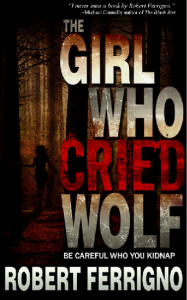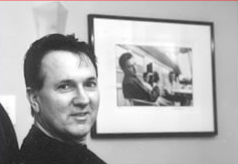 It’s Friday and I am letting the writers do the work for me! Today, I’ve got a really interesting guest post from Robert Ferrigno, author of The Girl Who Cried Wolf
It’s Friday and I am letting the writers do the work for me! Today, I’ve got a really interesting guest post from Robert Ferrigno, author of The Girl Who Cried Wolf, which just came out in February. You know that I love to hear from writers about their process — how they write, how they get inspired — and Robert has a unique process. I think you’ll be as fascinated as I was!
Look Around and Listen—We Are All Characters
One of the most useful skills a writer can develop is the ability to pay attention, to notice the things going around you. The bits of conversation, the clothes, the physical and verbal and non-verbal interactions of people. A good fiction writer is first and foremost a good observer, a good reporter. The best fiction is drawn from real events, real people and real problems.
The characters in my latest book, The Girl Who Cried Wolf, come from the people that I met while working as a reporter in Southern California. It was a great job, one in which I could write about nearly anything, though I tended to lean towards what piqued my interest—California sleaze balls, new money and youth culture.
I was a reporter for eight years and in that time I wrote hundreds of profiles, interviews what I called “involved journalism.” I flew with the Blue Angels, and was even given the stick, whereupon I inadvertently threw my pilot and I into a barrel-roll. I did desert survival training. I drove race cars, went on midnight runs with auto repo men and reported on women who made their living entering bikini contests. (My wife was less than happy about that one) What I am doing now with my crime novels is using those same reporting skills, but with a spin, an ability to let the characters breathe and take me and the reader where things are most interesting. I use current headlines to form of basis of The Girl Who Cried Wolf, and use people I’ve met along the way as characters.
My style of writing may differ from the methods used by other writers. Having earned degrees in filmmaking, creative writing and philosophy, I use skills derived from each to formulate a plot and create characters. Through the use of filmmaking techniques such as storyboarding, I am able to visualize my books. When I write I think like an actor. I hear dialogue in my head and oftentimes find myself walking around my house, speaking to myself in different voices. (My family has learned to ignore this) I become the character.
Though this approach may not work for all writers, I can honestly say that above all else, the best advice I could give to a new or established writer is that the world is trying to help you with your writing. Notice how the people around you dress, their choice of shoes, their jewelry or lack of jewelry, their speech pattern, their slang. Each choice people make in how they present themselves to the world can be used by the writer in the characters they create and the plots they write about.
As a narrative designer in the video game industry, my eyes were opened to the video game world which was an evolution for me. The video game office is a place where people come to work in their pajamas or in, what those in the “real world” would call—semi costumes. It doesn’t even raise an eyebrow—whether it’s men in kilts or women wearing furry hats. I spend a lot of my time taking it all in, making mental notes, but I’m also a guy who wears basic black and hightops every day, so I’m sure I am a source of amusement also.
The most important takeaway from what I have learned in my professional experience is to simply listen. If you want to talk to someone or compile research for a book, approach the people you meet without an agenda—I learned this as a reporter. Just talk to people. What you may not realize is that the way that people talk and what they say makes for such great dialogue. If you want to capture a character with wonderful dialogue that you can hear in your head, consider taking it from people you have already met. You know what they look like, how they sound and what they said—now turn them into a character. I believe this is one of the most useful skills a writer can have. Most people want to tell you their story. All you have to do is listen… and find the deeper story within.
For more information, check out his website at http://robertferrigno.com/


